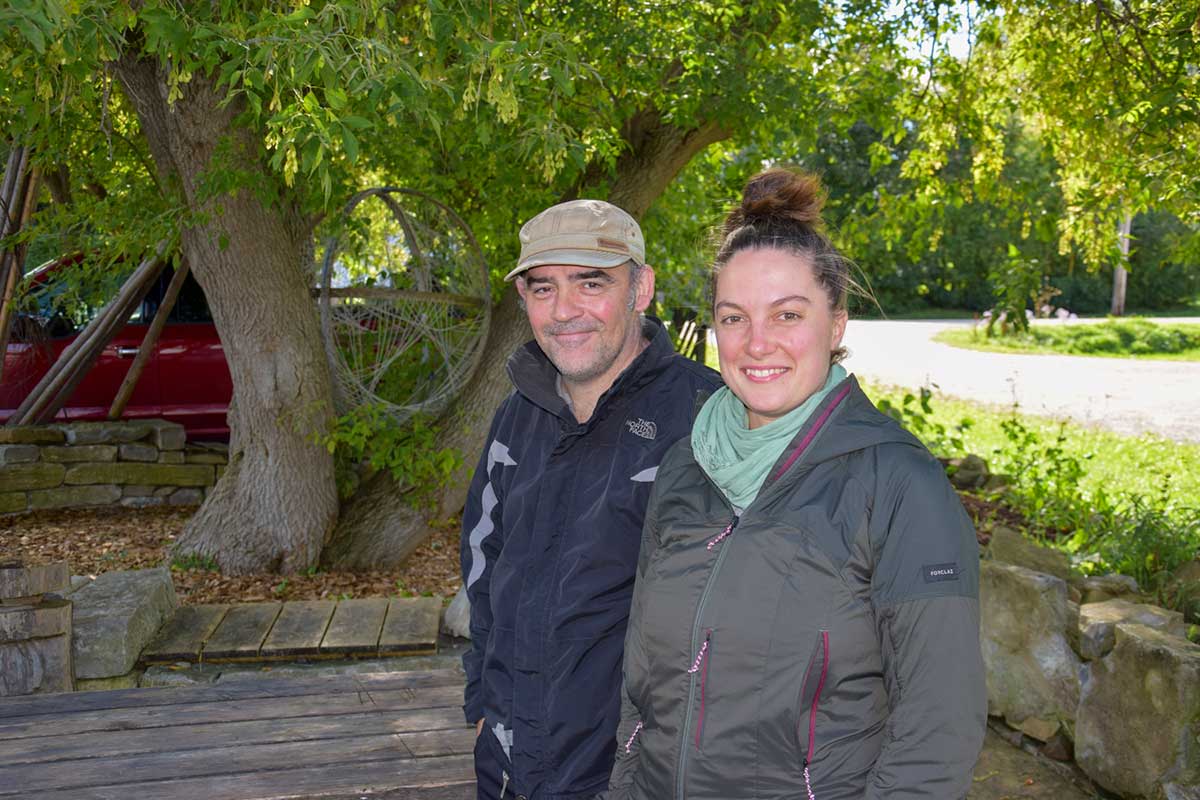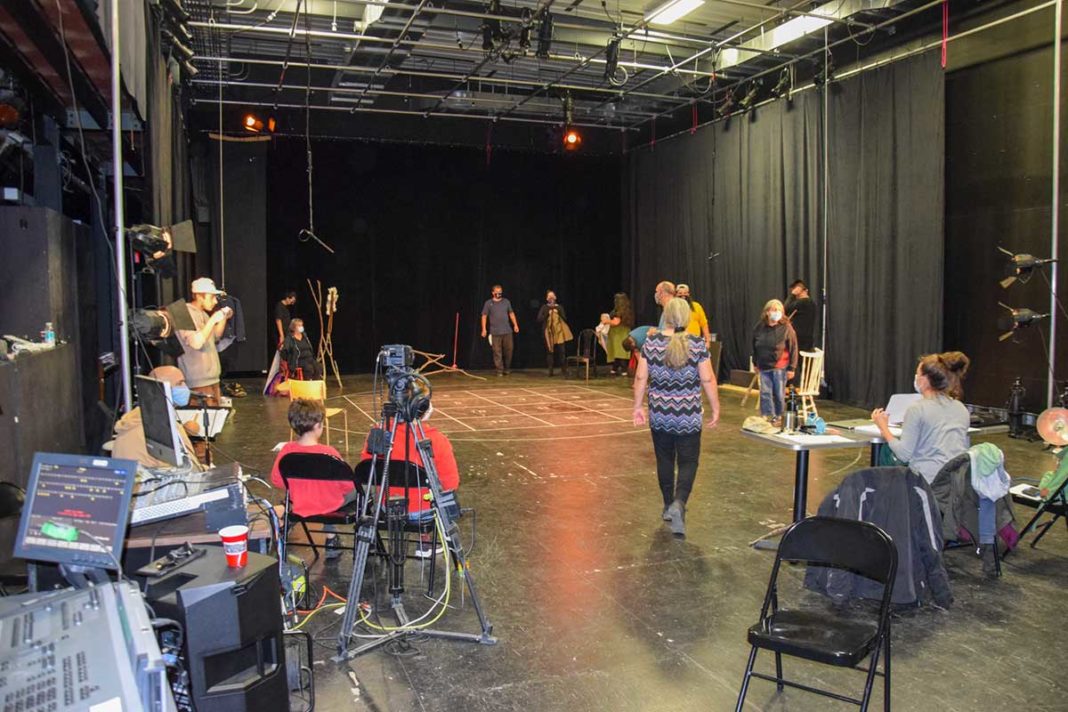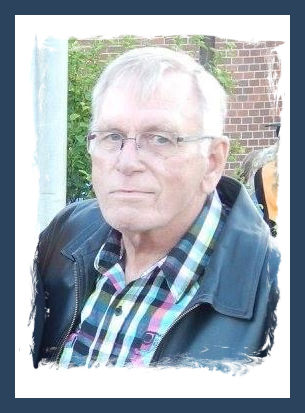MANITOWANING – The Debajehmujig Creation Centre is bustling with activity as directors, actors and stage hands near the culmination of weeks of work on the Canadian portion of the ‘TransPoetico Trilogy, Epic Borders,’ which takes place in Mexico, Northern Ireland and Canada.
The mainstage event is an international collaboration between the actors and support staff of Debajehmujig and Manifesto Politico, an international arts organization with a foot in many waters.
The Expositor caught up with co-directors Canadian Paige Allerton and Carlos García Estévez while they were taking a break from the arduous rehearsal schedule.
Ms. Allerton is an international performing artist in her own right and an anthropologist who is in charge of the conception and direction of Manifesto Poetico’s Open Laboratories and its pedagogic activity. She is a movement teacher and performs with masks internationally. Mr. Estévez is a an actor, stage director, theatre researcher, pedagogue and specialist in Contemporary Commedia dell’Arte and mask performance. He is the Artistic director of Manifesto Poetico as well as an associate artist and teacher at L.E.M. (School of Jacques Lecoq) in Paris.
Commedia dell’Arte is defined “as an improvised kind of popular comedy in Italian theaters in the 16th–18th centuries, based on stock characters. Actors adapted their comic dialogue and action according to a few basic plots (commonly love intrigues) and to topical issues.” The form remains relevant in theatre up onto the modern era, hence the “contemporary” appellation.
The co-directors explain how they came to be working with Debajehmujig and the fundamental theme of the trilogy they have been spearheading.
“We are making a show with the local Debajehmujig artists,” said Ms. Paige. “It’s totally from scratch. We didn’t have a story when we arrived and it’s been a six-week creation process. It’s actually the end of a trilogy.”
Ms. Allerton explains the piece is part of Epic Borders, a trilogy that began in Guadalajara, Mexico with part one in 2019 with local artists, the second part was created in Belfast, Northern Ireland. “This is the third part of the trilogy that was supposed to happen right after, but then COVID-19 happened,” said Ms. Allerton.
There will also be a film version of the trilogy published online.
This is the duo’s first work with Debaj, but they had visited Debaj two years ago, before COVID, as they were starting the project.
First part of the trilogy is entitled ‘The Gate of Hope,’ explained Mr. Estévez. “It has to do with borders, but from an immigration point of view, if you want, all the issues that pop up.” The ongoing issues surrounding refugees, economic and otherwise, across from the southern United States. The second part utilizes the issues that have arisen from Brexit, the extrication of Great Britain from the European Union, specifically those that arise between the Republic of Ireland, which remains part of the European Union and Northern Ireland, which is part of Great Britain.
The third segment of the trilogy takes a different tact, examining the borders between humanity and the environment. In this segment, the co-directors felt they were not sufficiently qualified to speak on the subject matter. Enter Debajehmujig.
Mr. Estévez explained that in 2016 they attended a world social forum in Montreal, as artists, not scientists, where they met an extraordinary gentleman, Riccardo Petrella, author of ‘Audacity of the World,’ who is very much the scientist. The duo were very taken with Dr. Petrella’s work and took the opportunity to meet him.

“He asked us what we were doing there, being artists and not scientists,” recalled Mr. Estévez, who went on to assert that they were probably the most important people attending the conference. “At first we thought he was being comedic,” said Mr. Estévez. But the scientist explained that he communicates with other scientists, those who utilize the rarified lingua franca of academia, and that the artists could form a bridge between the hard scientific language and the public by interpreting what was being said into symbols and metaphors that the common person could more easily grasp.
Dr. Petrella’s book speaks on how the challenges facing humanity today, global in scope as they are, can only be tackled if the whole world strides forth with the audacity needed to meet those challenges.
“He said, ‘why don’t you do a story about this?’”
The co-directors did not feel they were the people who should be telling this part of the story, that of the borders between humanity and the land, but that it should be told by those with closer links to the land.
“Someone suggested to us, ‘what about the Indigenous theatre company on Manitoulin?’” said Mr. Estévez. Manifesto Poetico reached out to Debaj and soon a collaboration framework was ironed out.
The production that has resulted utilizes issues that arise locally to tell a story that reaches out to global issues, expressed in the viewpoint of actors from a land-based theatre company (and a group of associated elders who lend their talent, humour and well-grounded insight to help flesh out the bones of the story).
The Expositor had the opportunity to sit in on a full run of the story, so far, and sat spellbound through the performance. We might humbly suggest our readers take the opportunity to catch this important piece of international work being created locally, here on Mnidoo Mnising—Manitoulin Island. The production will take the stage as part of Debaj’s annual Six-Foot Festival with shows at 7 pm on October 7 and 8, and 5 pm on October 9. Performances of part Three of the ‘Epic Borders Trilogy, In the Name of Humanity’ will take place at the Larry E. Lewis Studio at the Debajehmujig Creation Centre. Admission is $20. Call 705-859-1820 to reserve tickets.





